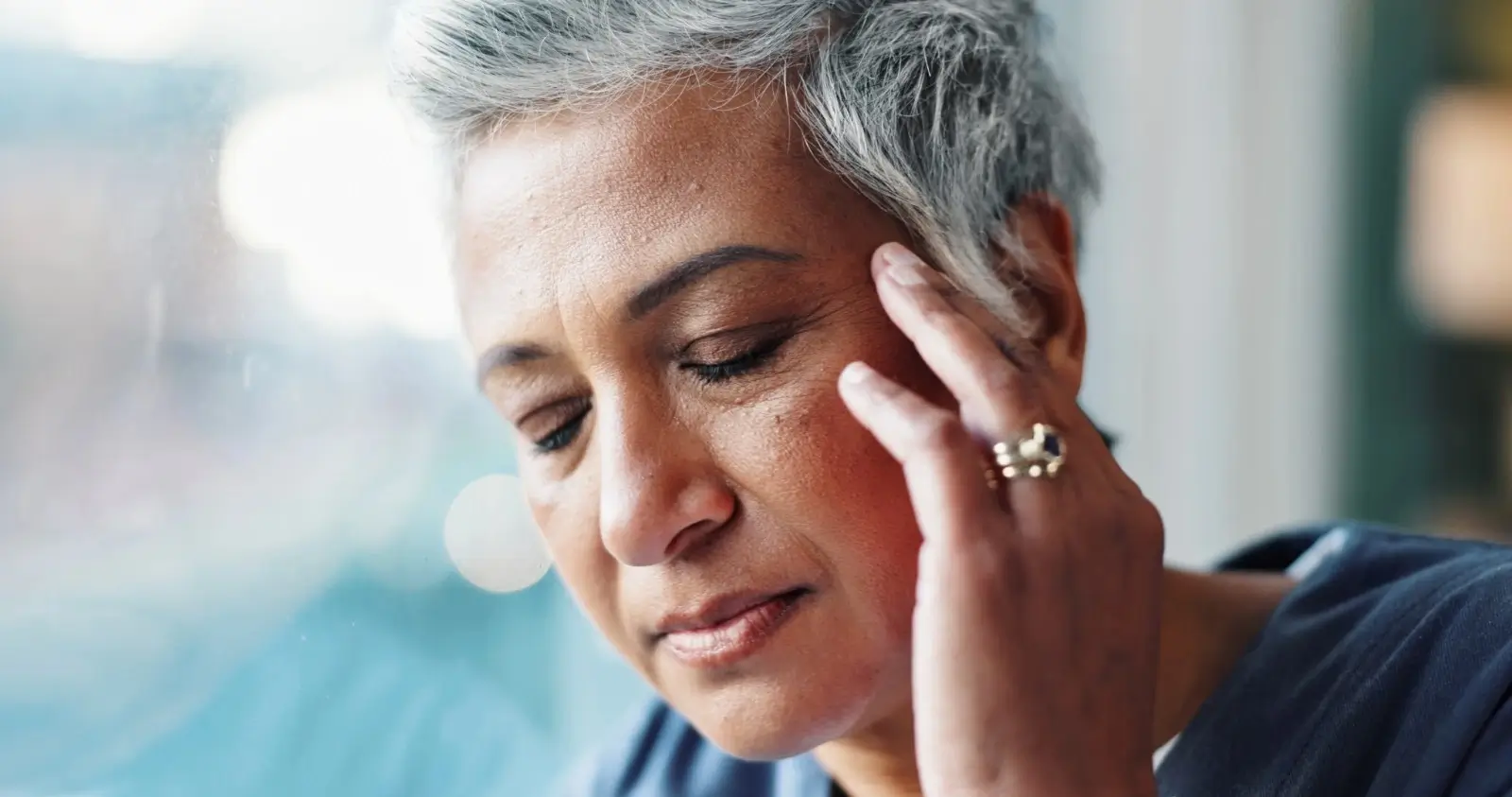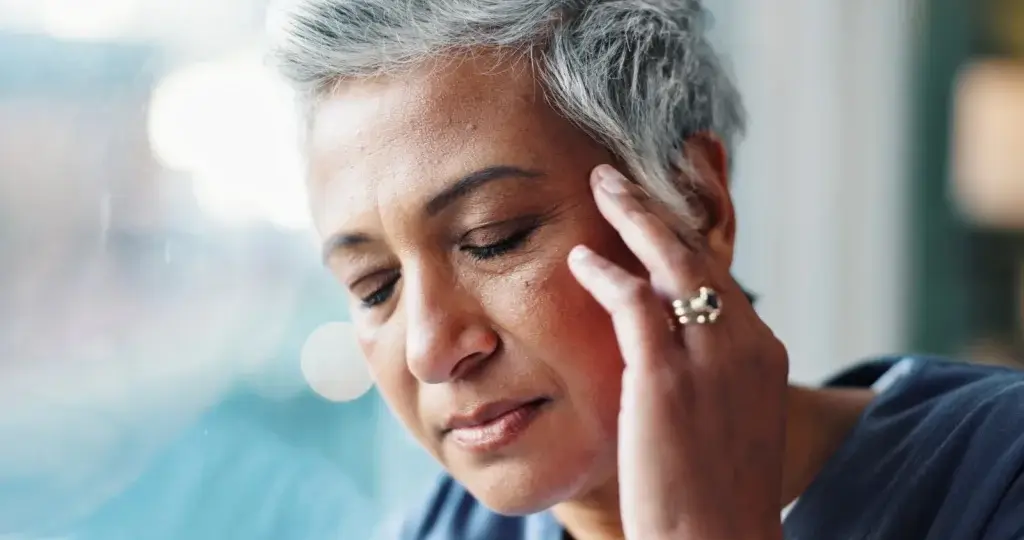

Menopause is often described as “the change,” but if you’ve ever experienced even the earliest signs, you know it’s far more complex than that. It’s not just hot flashes and missed periods — it’s a full-body transformation that can show up in ways you never expected. And while every woman’s journey is unique, doctors now recognize 34 common symptoms of menopause that affect women worldwide.
For Indian women especially, menopause often comes wrapped in silence and stigma. Many of us grow up never hearing about what’s ahead until we’re right in the middle of it — waking up at 3 AM, sweating through the night, or wondering why our moods feel like a rollercoaster.
This guide is written for you — warm, real, and research-backed. Whether you’re curious about what are the symptoms of menopause in a woman, navigating early menopause symptoms, or asking how long can menopause symptoms last, this is the 2025 guide doctors wish every woman had in her hands.
Menopause is defined as the point when you haven’t had a period for 12 consecutive months. But the transition leading up to it — perimenopause — is where most symptoms begin. This stage can last anywhere from 4 to 10 years, and for some, symptoms linger into postmenopause.
In India, the average age of menopause is around 46 years (younger than the global average of 51). That means many Indian women experience symptoms earlier, while still balancing careers, families, and caregiving. Add to this the cultural hush around “women’s problems,” and it’s no wonder so many silently struggle without support.
Doctors stress that understanding these 34 symptoms isn’t about scaring you — it’s about empowering you. Because once you know what’s happening, you can seek help, explore solutions, and take back control of your health.
Let’s break them down into categories, because menopause impacts nearly every system in your body.
Hot flashes – These are sudden surges of heat that spread through your body, often starting in the chest and face and moving upward. They can last anywhere from 30 seconds to several minutes, leaving you flushed, sweaty, and sometimes even dizzy. Some women experience them a few times a week, while others may have several each day. Triggers like caffeine, stress, or spicy food can make them worse.
Night sweats – Imagine a hot flash hitting you while you’re asleep. That’s a night sweat: waking up with drenched clothes or soaked sheets, sometimes multiple times a night. Beyond being uncomfortable, it disrupts deep rest, leaving you tired and irritable the next day. Over time, poor sleep can spill into your mood, focus, and even long-term health.
Chills – After the intense heat of a flash, many women feel a wave of cold or shivering. This temperature “yo-yo” can be frustrating and confusing, especially when you’re constantly adding and removing layers of clothing or fiddling with the AC.
Why it matters:
Vasomotor symptoms are the hallmark of menopause — affecting up to 80% of women. They may seem “minor,” but hot flashes and night sweats can reshape daily life, from sitting in meetings flushed with heat to waking night after night in damp sheets.
Doctors warn that when frequent, these symptoms aren’t just uncomfortable — they’re linked to higher risks of sleep problems, depression, and even heart issues. The good news is they can be managed through lifestyle changes, stress reduction, cooling techniques, and for some women, Hormone Replacement Therapy (HRT). Understanding what’s happening in your body is the first step to feeling more in control.
Insomnia – Falling asleep suddenly feels like a battle you can’t win. Even when you’re exhausted, your mind won’t quiet down, or you keep tossing and turning. Hormonal changes, especially declining estrogen and progesterone, play a role in disturbing the body’s natural sleep-wake cycle.
Early waking – The 3 AM wake-up is practically a menopause trademark. You fall asleep fine, but like clockwork, your eyes pop open in the middle of the night — sometimes from a night sweat, sometimes for no reason at all. Getting back to sleep can feel impossible.
Daytime fatigue – Poor sleep leaves you dragging through the day, struggling to focus or keep your energy up. It’s more than being “a little tired.” Fatigue during menopause often feels bone-deep, affecting work, relationships, and motivation.
Why it matters:
Sleep is the foundation of your health. Without it, everything from mood regulation to heart health suffers. Studies show women in perimenopause are 2–3 times more likely to experience sleep problems than before. And it’s not just about feeling groggy — long-term poor sleep increases the risk of anxiety, depression, diabetes, and even cognitive decline.
What’s even harder is the vicious cycle: lack of sleep worsens hot flashes, mood swings, and weight gain, which in turn make sleep worse. But here’s the hopeful part — strategies like cooling the room, mindfulness practices, exercise, and medical support (including HRT if suitable) can help break the cycle and restore rest.
Brain fog – Suddenly forgetting why you walked into a room or struggling to find the right word mid-sentence. Brain fog during menopause isn’t about losing intelligence; it’s about fluctuating estrogen affecting how your brain processes and recalls information.
Memory lapses – It can be scary when you can’t recall names, appointments, or even conversations. While it’s often temporary, these lapses can feel unsettling — and for many women, they bring unnecessary fear of dementia.
Difficulty concentrating – Reading a page and realizing you didn’t absorb a word, zoning out during meetings, or losing focus mid-task. Declining hormones disrupt neurotransmitters like serotonin and dopamine, making concentration harder.
Mood swings – Think teenage hormones, but with adult responsibilities. You may go from laughing to crying in minutes, and it’s not “just in your head.” Hormonal changes genuinely influence emotional regulation.
Irritability – The smallest things suddenly feel unbearable. This isn’t weakness — research shows menopause shifts stress response pathways in the brain, making patience shorter.
Anxiety – A restless nervous energy that wasn’t there before. Even confident women report a surge in anxiety during perimenopause, triggered by hormonal imbalance and poor sleep.
Depression – While not every woman develops clinical depression, low moods, loss of interest, or sadness are common. The drop in estrogen and progesterone impacts serotonin levels, the brain’s “happy” chemical.
Panic attacks – Rapid heartbeat, chest tightness, sweating — panic can arrive uninvited. For women in midlife who’ve never experienced this before, it can be alarming and mistaken for heart problems.
Why it matters:
Mental health shifts in menopause are often overlooked — brushed off as “just stress” or “getting older.” But for many women, these symptoms are life-altering. Studies show women are at higher risk of depression during perimenopause than at almost any other life stage.
Beyond mood, brain fog and poor concentration can undermine confidence at work and home. Women often feel guilty or “less capable,” when in reality it’s biology, not a personal failing. Recognizing these symptoms allows women to seek help — whether through therapy, medical support, mindfulness, or community — instead of silently struggling.
Palpitations – A sudden fluttering or pounding heartbeat can feel scary, especially if you’ve never experienced it before. Hormonal shifts affect how your heart responds to stress, leading to episodes of racing or skipped beats.
Weight gain – Many women notice weight collecting around the belly, even when their diet and lifestyle haven’t changed. Lower estrogen alters how the body stores fat, making midsection weight gain common.
Slowed metabolism – Calories that once burned off easily now seem to stick around. Hormonal changes slow your metabolic rate, which makes maintaining weight more challenging.
Insulin resistance – Menopause can make the body less effective at using insulin, raising blood sugar levels. This not only contributes to weight gain but also increases the risk of developing type 2 diabetes.
Why it matters:
These shifts aren’t just surface-level frustrations. They affect heart health, blood sugar balance, and long-term well-being. But with mindful eating, strength training, and medical guidance, women can reduce risks and feel strong in midlife and beyond.
Joint pain – Achy knees or stiff hips when getting out of bed become common. Estrogen protects joint tissues, so its decline can leave joints inflamed and sore.
Muscle aches – Even without overexertion, muscles can feel tender or fatigued. Hormonal changes impact how muscles recover and hold energy.
Osteoporosis risk – Lower estrogen accelerates bone loss, making bones thinner and more fragile. This increases the risk of fractures, even from small falls.
Loss of muscle mass – Women naturally lose about 8% of muscle each decade after 30, but menopause speeds this up. Without intervention, strength and mobility decline faster.
Why it matters:
Bone and muscle health are key to independence and vitality. Ignoring these symptoms can lead to osteoporosis and frailty, but weight-bearing exercise, good nutrition, and therapies like HRT can keep women active and resilient.
Vaginal dryness – Declining estrogen reduces natural lubrication, leaving tissues thinner and more fragile. This often causes itching, discomfort, or pain.
Painful intercourse – Without lubrication, intimacy can become physically uncomfortable or even painful, sometimes leading women to avoid sex altogether.
Lower libido – Desire can drop due to hormonal changes, fatigue, or emotional shifts, which may feel confusing or frustrating.
Urinary incontinence – Leaking when sneezing, coughing, or laughing is common. Pelvic floor muscles weaken with declining estrogen.
Urinary frequency/urgency – Feeling like you constantly need to go — even at night — disrupts comfort and sleep.
Recurring urinary tract infections (UTIs) – Hormonal changes alter vaginal pH and microbiome balance, making infections more likely.
Why it matters:
These symptoms are deeply personal, yet they impact relationships, confidence, and daily life. The good news is they’re highly treatable with options like lubricants, pelvic floor therapy, or vaginal estrogen. Talking openly breaks the silence and opens the door to relief.
Hair thinning – Estrogen supports hair growth; when it declines, hair may thin, especially at the crown.
Dry skin – Skin loses elasticity and hydration, leading to dullness or fine lines.
Itchy skin – Sometimes linked to dryness, this can appear as general irritation or prickling sensations.
Brittle nails – Nails break or peel more easily as estrogen drops, reducing keratin production.
Headaches or migraines – Hormonal fluctuations can trigger new headaches or change old migraine patterns.
Digestive issues – Bloating, constipation, or indigestion may increase. Estrogen influences gut motility and microbiome health, so its decline changes digestion.
Why it matters:
These outward signs may seem “cosmetic,” but they influence how women feel in their own skin. They also point to internal changes in hydration, inflammation, and hormone balance. With care — from skincare to nutrition to medical support — women can feel comfortable and confident in their bodies again.
When menopause arrives before 40, it’s called premature menopause; before 45, it’s considered early menopause. Symptoms are the same as above, but often hit harder and faster — disrupting fertility, heart health, and bone strength earlier than expected.
Common triggers include genetics, autoimmune conditions, medical treatments like chemotherapy, or surgical removal of ovaries. For Indian women, cultural unawareness often delays diagnosis, leaving early menopause overlooked.
Here’s the truth most women wish they knew earlier: menopause isn’t a few months — it can last years.
Hot flashes and night sweats: average of 7 years, sometimes up to 12.
Mood and sleep issues: can ebb and flow through perimenopause into postmenopause.
Vaginal dryness and bone changes: may persist indefinitely without treatment.
The good news? Lifestyle shifts, medical options like Hormone Replacement Therapy (HRT), and holistic care can dramatically improve quality of life.
In India, menopause often arrives earlier, lasts longer, and is less openly discussed. Add to that the fact that women here juggle multiple roles — caregiver, professional, homemaker — and the burden grows heavier.
Studies reveal:
80% of Indian women report at least one severe symptom.
Yet only 1 in 5 seek medical advice.
Cultural stigma often discourages open conversations around sex, vaginal health, and emotional wellbeing.
This silence is why doctors stress education. The more women know about what’s happening in their bodies, the faster they can seek support and avoid long-term risks like osteoporosis, diabetes, and heart disease.
Reading through 34 symptoms may feel overwhelming, but here’s the empowering truth: you don’t have to tick every box. Every woman’s menopause looks different. Some sail through with just hot flashes; others face multiple layers of change.
The point of knowing the full list is to connect the dots. That nagging joint pain, the sudden anxiety, the brittle nails — they might not be random. They may be part of your menopausal transition.
And once you know that? You can talk to your doctor, explore treatments, and remind yourself that you’re not “losing it” — you’re simply moving through a natural (and manageable) phase of life.
So, what are the 34 symptoms of menopause? They’re the body’s way of adjusting to a new hormonal balance — sometimes loud, sometimes subtle, often confusing.
But here’s what doctors want you to remember: menopause isn’t the end of vitality, it’s the start of a new chapter.
Yes, the symptoms can be uncomfortable, even overwhelming. But with awareness, medical support, lifestyle changes, and community, you can navigate this stage with strength, grace, and confidence.
Let’s rewrite the story of menopause together — from silence and stigma to openness and empowerment. Because you deserve to thrive, not just survive, through midlife and beyond.
Yes. Research shows that Indian women often reach menopause earlier (average age 46 vs. 51 in the West) and report more severe vasomotor symptoms like hot flashes and night sweats. Cultural stigma and underdiagnosis also mean Indian women may go longer without treatment, making symptoms feel heavier.
Menopause isn’t a single event; it’s a transition. Hormonal fluctuations continue in the years after your last period, which means hot flashes, mood changes, or vaginal dryness can still appear or persist well into postmenopause.
Absolutely. High stress raises cortisol, which not only worsens hot flashes and sleep disruptions but also magnifies mood swings and weight gain. Lifestyle factors like smoking, high sugar intake, or lack of movement can also intensify symptoms — making self-care a critical part of menopause management.
Yes. Heart palpitations may feel like anxiety or even heart disease, joint pain may be mistaken for arthritis, and brain fog often gets confused with early dementia. This overlap is why many women don’t connect their symptoms to menopause right away — and why doctors stress awareness of the full spectrum of 34 symptoms.
Genetics, body weight, diet, and lifestyle all play a role. Women with strong social support, regular physical activity, and balanced nutrition often report fewer symptoms. Family history also matters, if your mother or sisters had mild symptoms, you may too. But there’s no one-size-fits-all; every body responds differently.


